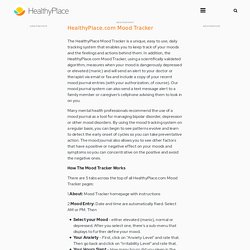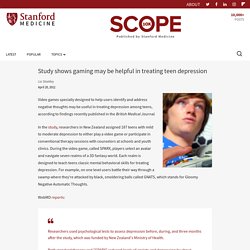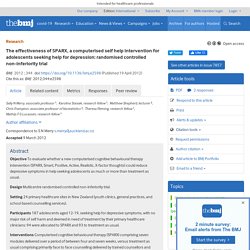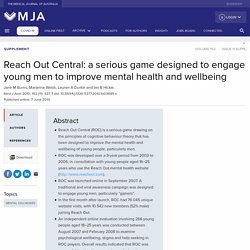

Elude. ELUDE: 2010 GAMBIT Summer Game. Game yourself out of depression - On Serious Games. Therapeutic Applications. Are you happy or sad? New smartphone app maps your mental state. The Xpression app phone display, with the bottom box detailing the emotion analyzed as present in the speech sample.

New smartphone app allows users to record their mood through their speech acousticsThe app is designed to be used in the clinical treatment of stress and depressionIt could replace manually-recorded "mood diaries", which patients often leave incompleteApp may also appeal to consumers interested in self-tracking technology London (CNN) -- A British firm is developing an app that will allow smartphones to track their owners' moods through their speech patterns, in the hope it can improve aspects of mental health treatment. The app, known as Xpression, will record the user's voice throughout the day, whether they are making a phone call or not, analyzing the acoustics for emotional content. "Over half of adults in the UK suffer from severe stress once or twice a week so there's a lot of opportunity in the market," he said. "This replaces that old technology. Mood Journal Plus. Features - MoodPanda.
Mood Chart, Mood Journal, Mood Tracker – Free, Online. HealthyPlace.com Mood Tracker The HealthyPlace Mood Tracker is a unique, easy to use, daily tracking system that enables you to keep track of your moods and the feelings and actions behind them.

In addition, the HealthyPlace.com Mood Tracker, using a scientifically validated algorithm, measures when your mood is dangerously depressed or elevated (manic) and will send an alert to your doctor or therapist via email or fax and include a copy of your recent mood journal entries (with your authorization, of course). Our mood journal system can also send a text message alert to a family member or caregiver’s cellphone advising them to look in on you. Many mental health professionals recommend the use of a mood journal as a tool for managing bipolar disorder, depression or other mood disorders. By using the mood tracking system on a regular basis, you can begin to see patterns evolve and learn to detect the early onset of cycles so you can take preventative action.
How The Mood Tracker Works. mHealthcoach. News Services - News Story. Study: Casual video games demonstrate ability to reduce depression and anxiety. Hidden Depression May Respond to Wii Treatment. Real-world exercise helps seniors with depression, what about the video version? RODALE NEWS, EMMAUS, PA—Antidepressant use among older adults has risen gradually over the past few decades, from roughly 4 percent in the late 1980s to 11 percent earlier this decade. Yet, only 1 percent of adults over the age of 60 are diagnosed with major depression, leading many psychologists to think that depression in older adults is either overlooked or misdiagnosed.
Psychiatry and Video Games. SPARX. Metia Interactive. Here you will find some of the games we've developed. To find out more on each game follow the links below, you will be directed to each games website. PUZZLE-FUELED PANDEMONIUM! Cube™is a puzzle game with action elements, simple in concept and highly addictive. Set within a 3d cubic world, the player explores and discovers their way through suspended 3d platforms and mazes. Each themed level contains its own variety of contraptions specifically suited for the theme. For more information visit this link The Sparx game is our first ‘Serious Games’ project designed and developed for the Faculty of Medical and Health Sciences of the University of Auckland and funded by the Ministry of Health New Zealand. For more information please visit this link The Guardian is an exciting property being developed as a 3D action game with an original compelling storyline that combines paranormal and real world combat. For more information visit this link.
This Video Game Actually Treats Teenagers' Depression. Study shows gaming may be helpful in treating teen depression. Video games specially designed to help users identify and address negative thoughts may be useful in treating depression among teens, according to findings recently published in the British Medical Journal.

In the study, researchers in New Zealand assigned 187 teens with mild to moderate depression to either play a video game or participate in conventional therapy sessions with counselors at schools and youth clinics. During the video game, called SPARX, players select an avatar and navigate seven realms of a 3D fantasy world. Each realm is designed to teach teens classic mental behavioral skills for treating depression.
The effectiveness of SPARX, a computerised self help intervention for adolescents seeking help for depression: randomised controlled non-inferiority trial. Sally N Merry, associate professor1, Karolina Stasiak, research fellow1, Matthew Shepherd, lecturer2, Chris Frampton, associate professor of biostatistics3, Theresa Fleming, research fellow1, Mathijs F G Lucassen, research fellow1Author affiliationsCorrespondence to S N Merry s.merry@auckland.ac.nzAccepted 9 March 2012 Abstract Objective To evaluate whether a new computerised cognitive behavioural therapy intervention (SPARX, Smart, Positive, Active, Realistic, X-factor thoughts) could reduce depressive symptoms in help seeking adolescents as much or more than treatment as usual.

Design Multicentre randomised controlled non-inferiority trial. Setting 24 primary healthcare sites in New Zealand (youth clinics, general practices, and school based counselling services). Outcomes The primary outcome was the change in score on the children’s depression rating scale-revised. Trial registration Australian New Zealand Clinical Trials ACTRN12609000249257. Introduction Methods Trial design Participants. Video Game May Help Treat Teen Depression. Reach Out Australia: information and help about tough times and mental health issues such as depression, anxiety, suicide, eating disorders, bullying and relationship issues. - ReachOut Australia.
Reach Out Central: a serious game designed to engage young men to improve mental health and wellbeing. Young men in Australia have higher rates of completed suicide, antisocial behaviour, and drug and alcohol problems than young women.1 They are also less likely to seek help during the formative adolescent and young adult years, with results from the 2007 National Survey of Mental Health and Wellbeing indicating that only 13% of young men aged 16–24 years seek help when experiencing mental health difficulty.2 These figures are at odds with findings suggesting that most young people: know someone experiencing depression and can therefore identify the symptoms of the illness;3 are aware of evidence-based treatments; and can recognise the helpfulness of exercise, brief psychological therapies, medication and counselling, as well as the harmfulness of alcohol or illicit substances.4 4.

Hickie IB, Fogarty AS, Davenport TA, et al. Responding to experiences of young people with common mental health problems attending Australian general practice. Med J Aust 2007; 187 (7 Suppl): S47-S52. 3. 2.